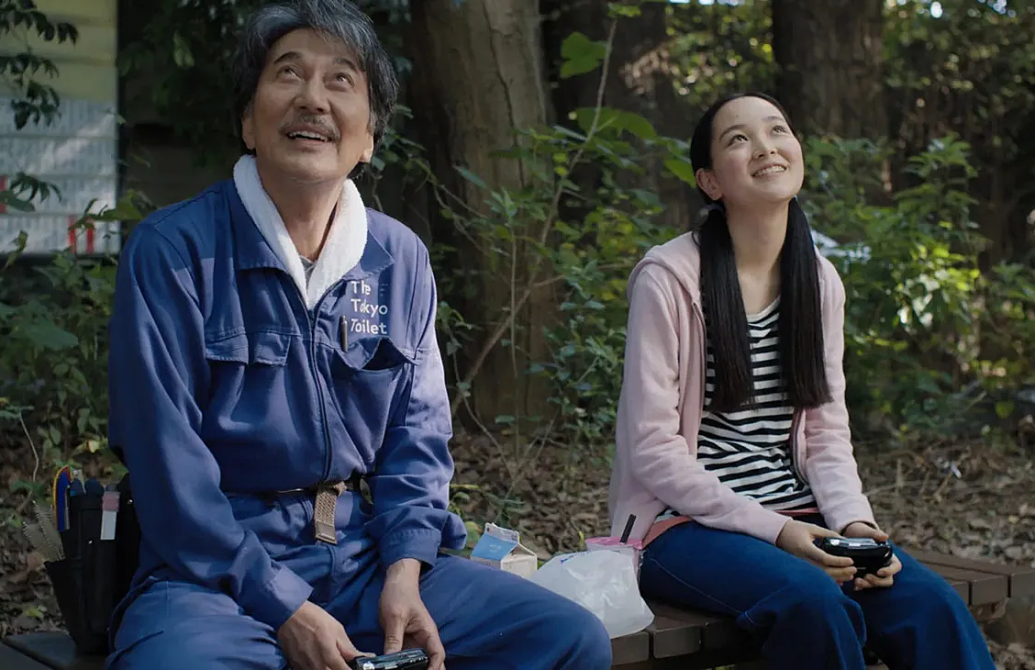“Perfect Days,” directed by Wim Wenders, isn’t a film packed with dramatic twists. It follows the life of a man named Hirayama, who works cleaning public restrooms in Tokyo’s Shibuya district.
If you’re after a cinematic experience with dazzling effects, a gripping plot, or grand messages about success, love, or resilience, this might not be the movie for you. For the first 60 minutes, what unfolds on screen feels so ordinary it might even seem dull.
But if you pause to reflect, you and I might find that this very plainness holds a certain richness. Like pure water—colorless, unadorned—yet for ages, it’s been the simplest, most effective way to quench a thirst.
Everyday life is inherently bland, but it’s how we see it and live it that adds flavor. That’s why some taste bitterness, others sweetness, some feel heat, while others shiver. Halfway through life, some fade into blandness, while others grow ever more vibrant.
Hirayama doesn’t say much, but through this film, he’s reminded me of a few things I find quietly valuable. I’ll weave them into this reflection. Fair warning: some of this might hint at the movie’s story. Still, I hope you’ll watch it yourself to feel it fully. Analyzing a poem doesn’t make it better, just as dissecting a painting doesn’t enhance its beauty—only stepping into it with your own senses reveals its true worth.
A Simple Life
An ordinary worker, Hirayama rises early to water his plants. Stepping outside, he tilts his head to the sky with a grateful smile. He grabs a can of coffee from a vending machine, then drives off to work, slipping in a favorite cassette to let nostalgic melodies fill the air.
His job is scrubbing and tidying public restrooms. He works diligently, even knowing that minutes later, users will undo his efforts. The next morning, he’s back at it again. At lunch, he takes sandwiches to a park, savoring them while occasionally pulling out an old camera to snap photos of trees and sunlight filtering through leaves.
In the afternoons, he visits a public bathhouse. Sometimes he stops by a familiar diner or a shop for books, films, or camera supplies. Books, photos, cassettes, and plants are his closest companions. He’s a man of few words, but that doesn’t mean he’s ignorant. He may have few friends and no partner, but he’s far from heartless.
That’s Hirayama.
I doubt he was born craving this life. The director cleverly conceals his past and future plans, keeping us anchored in the present he’s chosen. As Hirayama tells his niece: “Next time is next time.” “Now is now.”
Living in the Moment
That’s the first thing that struck me about this film: living fully in the present. His mindful way of being might remind you or me of Buddhist teachings. But I don’t think it’s tied to religion. Religion tells us how to live, and in measuring our lives against its rules, we can miss the life itself. Ambitions drive us forward, but they can also block us from accepting the moment. The glittering heights of fame and wealth make it easy to prove ourselves, yet just as easy to overlook the humble, dear people around us. In this, Hirayama sees clearer than most—though I suspect he’s earned that clarity through hard-won lessons, settling into a life that looks effortless only after the struggle.
Quiet Compassion
When his sister arrives to pick up her daughter, she’s uneasy learning her brother cleans restrooms for a living. Hirayama doesn’t bristle; he just nods calmly. He doesn’t strike back the way people often do—digging into each other’s wounds with something like: “And you? Sure, you’re well-off, but look at your parenting. Why did your daughter run away?” A man who cherishes green sprouts can’t hate people. He understands them, and that makes him care more. To spare them hurt, he speaks only when he must.
That’s the second thing that caught my eye. At first, I wondered if Hirayama was mute. Then I realized he’s not—he just listens and watches, the mark of someone seasoned by life. Words build bridges between people, but they can also sever ties like a blade.
I love reading and writing, so I treasure language—its beauty, its utility. But I’ve had to ask myself: Do I sometimes talk too much or write too long? Speaking and writing are ways to express the self. Am I indulging mine too much? Then I recall a principle from counseling: don’t overtalk. The one who needs to speak is the client. If a counselor speaks just to flaunt knowledge, empathy falters, and a genuine, accepting connection slips away. A silver-tongued companion brings joy, but a quiet one brings peace.
I’ll keep talking and writing, but Hirayama’s restraint reminds me to hold silence a little closer.
Embracing the Human
The final thing that moved me is the film’s take on humanity: even in the simplest life, Hirayama faces annoyances from coworkers, the sting of disappointment, and others’ judgments. He doesn’t dodge these; he takes them in—crying when sad, laughing when happy. Come morning, he opens the door, looks to the sky, and smiles into a new day.
It’s a small, obvious thing, but one you and I could stand to borrow: a touch of romance, a dash of innocence, a bit of courage… though here I go again, rambling into the emptiness of words.
Daily life, unpolished, still shines. As a friend once put it to me, short and sharp where my pages falter:
“The flavor of life lies in its simple, clear joy.”
(A line from “Huan Xi Sha” by Song Dynasty poet Su Shi.)















